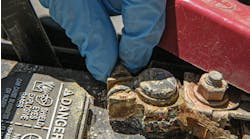Seventeen years ago, when Kent Coleman bought his first Big O Tires store, he admits he knew nothing about tires or automotive repair.
“I literally didn’t know the difference between a tire and a wheel.”
He’s come a long way.
Of the 11 Big O Tires stores he now owns in Utah, five are ranked in the top 10 as sales leaders for all Big O Tires locations in the country.
In 2021, one of his stores was the first Big O Tires store to ever eclipse $10 million in sales in a single year. (The store came close to hitting $10.5 million.)
Coleman’s smallest store rings up $3 million a year. He says an average Big O Tires location does about $2 million in revenue.
It hasn’t been a smooth ride to get to this point, however. Coleman nearly failed the introductory training for new franchisees. There were times he was borrowing money from a line of credit so he could make payroll and pay other bills. He’s hired and fired the wrong people.
But eventually, he and his team found their groove. And, Kent says, he learned the difference between a tire and a wheel.
Personality over experience
Coleman is a serial businessman.
He’s sold stickers in the scrapbooking industry, owned an online sporting goods business, picked cherries and in college cleaned and delivered garbage containers. Along the way, he’s developed a shrewd eye for sales.
And that’s been intentional. He hires, searches for and trains salespeople.
“We want them focused on sales.”
As part of that, he’s not afraid to train non-automotive types, like himself.
Coleman says his organization avoids the “merry-go-round” of workers who float from one tire dealership to the next.
“We hire from the outside as often as possible. Some of our top salespeople have been in the industry for five years or less. They’ve worked in construction, installed glass and been janitorial workers.”
His current team includes salespeople from lots of unrelated fields — cell phones, solar panels and even insurance. “We’re always on the hunt for these certain personality types who are good with people.”
One day, Coleman was at a local mall and encountered a cell phone salesman. “He was awesome - dynamic, not overbearing, but also not shy. He was this perfect little blend (and had me) wanting to talk to him.
“Within 90 days, he was a top producer” at Coleman’s company – with zero automotive experience.
“He had a degree in marketing from the University of Utah.”
Coleman says dynamic employees with a knack for connecting with people also have a knack for selling more.
That’s not meant to downplay the need for automotive expertise, but Coleman says he’s found that it works to pair an automotive specialist with a dynamic salesperson at the counter.
There are a minimum of four people working the sales counter at each of Coleman’s outlets. The biggest stores are staffed by eight salespeople up front.
He prefers this high-volume approach and when searching for stores to acquire, looks for bigger outlets with more service bays. The general plan is to have one salesperson for about three service bays, says Coleman.
“We do $6 million to $7 million out of six bays. I want to crank volume. We do want bigger stores. If the sales process is set up properly, there’s almost no limit to what a location can produce. We’re still testing those limits, I suppose.”
When his top-producing store was selling $8 million a year, he said “we’re going to do $10 million.”
Even his staff said this was impossible. But they crossed that threshold last year and Coleman says, “We’re up 15% this year. I don’t know what the limit is that a store can do.”
He credits the “amazing people” on his team for the success of his stores.
“When we do an acquisition, if we buy a store that’s doing $2 million in sales, we assume we can double it within six months,” says Coleman. “It’s all system and people.”
Last fall, he acquired another store and by all accounts, it “was doing great - $6 million a year.”
Thirty days after buying the location, Coleman says its sales were up 50%.
“One thing that I will look for is, ‘What is the constraint in the system?’ If you can identify and relieve the bottleneck,” business improves.
This store he acquired last fall already had a high car count. “The constraint was they didn’t have enough techs to get the work done. So we hired five people, taught the salespeople a few principles.
“We inspected vehicles better. That’s a huge one. And by doing that, we were able to relieve the bottleneck and output skyrocketed.”
Staffing solutions
If the bottleneck is not seeing enough cars, Coleman says the solution isn’t to hire more people. It’s to focus on a marketing plan.
He knows some will insist it’s impossible to find and hire the right staff. “I’ve heard that a million times” and it’s the question he’s asked most frequently. But it’s also a huge focus for his organization and a daily, never-ending task.
“We’ve added 20% to our staff and they’re talented people. It can be done. We’re obsessed with it.
“People wait for the merry-go-round and for people to pop into their store to come and work for them. We don’t rely on the merry-go-round. We spend money on recruiting. We recruit at tech schools. We bring in young people and train them.
“We recruit expensive people and pay them a lot to come (work for us.) We don’t let it be by chance. We don’t just hope people pop in.
“We’ll hire three salespeople for our company, having no spots for them. We always want to have a small bank of people that can step in as the holes open up.”
Coleman realizes that’s a luxury afforded to someone with 11 stores and that a single-store operator couldn’t have a bank of salespeople on staff waiting in the wings. But he encourages other tire dealers to think about staffing differently.
His company has produced a recruitment video and it’s available in both English and Spanish. He’s posted it on his own website, www.tireguykent.com, and elsewhere online to provide people with a glimpse into the company and perhaps a reason to join the team.
Coleman says his company spends “thousands of dollars a month on recruiting.”
“We invest in people like we invest in equipment. We try to be ahead.”
‘A huge leap of faith’
Even with nearly 20 years of success behind him, Coleman says he knows that his business has to continue to grow. But he also thinks there’s a right way to go about that.
“We want to add locations,” he explains. “But we don’t just add locations for the sake of it. We are very measured. I want a location I know can be a high-volume location. We also want to have continual growth at existing locations.”
As Coleman has pieced together his successful tire business, he’s also become a published author. He put the lessons he learned on paper, writing a book called “It’s Not About the Mangos: Organizational Success Means Putting People First.”
And without giving away the story behind the title, it’s fair to say Coleman has learned how to prioritize the people who work for him.
It’s a common refrain that the tire industry isn’t about tires and that it’s a people business instead. Coleman learned that lesson early, especially as it pertained to the people who work for him.
When his business was struggling, he looked for ways to cut expenses and ultimately settled on eliminating the most expensive staffers on his payroll.
“I thought I was a genius for saving on payroll,” he says.
The cost savings effort bit him and bit him hard, he admits.
He was left with apathetic employees who didn’t care that the boat was sinking. His “genius” move resulted in even poorer results. He then had a lightbulb moment.
If inexperienced people were cheap, but resulted in poor results, maybe it was worth it to pay premium wages for the best and most talented people. He considers himself lucky that he recognized his mistake.
“That was a huge leap of faith. But none of it works if the people don’t care. That’s really the foundation.”






